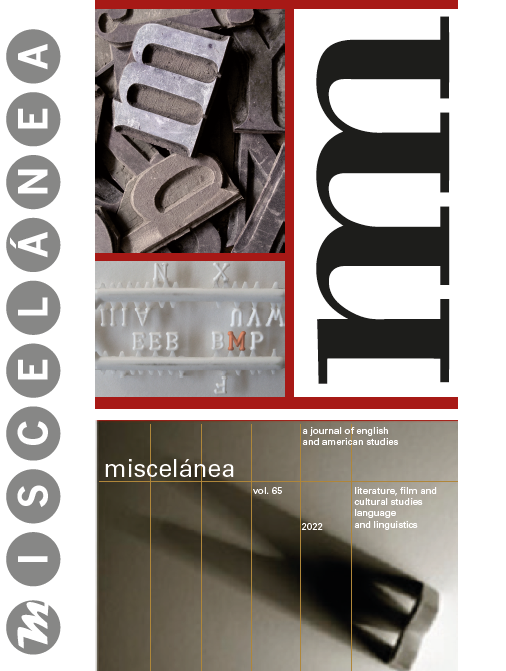Evelyn Waugh's Brideshead Revisited: Sites of Memory and Tradition
DOI:
https://doi.org/10.26754/ojs_misc/mj.20226848Keywords:
Brideshead Revisited, sites of memory, communities of memory, tradition, English CatolicismAbstract
In this article, it is my intention to analyse two theoretical notions related to space, namely Pierre Nora’s idea of the site of memory and Gaston Bachelard’s thoughts on space and the house, as applied to Evelyn Waugh’s Brideshead Revisited (1945). I base my analysis on the symbolic value of the English country house with regard to the interwar English aristocracy and upper classes as depicted in this novel; that is, as a site of memory. I consider the point of view of three characters: Charles Ryder, the novel’s first-person narrator, Lord Sebastian Flyte, Ryder’s intimate friend, and Lord Marchmain, Sebastian’s father, who triggers the novel’s sudden and unexpected ending through his deathbed conversion to Roman Catholicism, his family’s creed. My conclusion links the decline of aristocratic and Christian ideals with the disappearance of communities of memory and their traditions after the Second World War.
Downloads
References
Augustine of Hippo. (AD 397-400) 2001. The Confessions of Saint Augustine. Trans. R. Warner. New York and London: New American Library.
Bachelard, Gaston. 1994. The Poetics of Space. Trans. M. Jolas. Boston, MA: Beacon Press.
Berberich, Christine. 2007. The Image of the English Gentleman in Twentieth-Century Literature: Englishness and Nostalgia. Aldershot and Burlington, VT: Ashgate.
Cannadine, David. 1999. The Decline and Fall of the British Aristocracy. New York: Vintage.
Carey, John. 1992. The Intellectuals and the Masses: Pride and Prejudice among the Literary Intelligentsia. London: Faber and Faber.
Clinton-Baddeley, V.C. (1945) 1984. “Spectator”. In Stannard, Martin (ed.): 237-238.
Coffey, Laura. 2006. “Evelyn Waugh’s Country House Trinity: Memory, History and Catholicism in Brideshead Revisited”. Literature and History 15 (1): 59-73. DOI: https://doi.org/10.7227/LH.15.1.4
Davis, Robert M. 1992. “Imagined Space in Brideshead Revisited”. In Blayac, Alain (ed.) Evelyn Waugh: New Directions. Basingstoke, Hampshire: Macmillan: 22-34.
Deslandes, Paul R. 2005. Oxbridge Men: British Masculinity and the Undergraduate Experience, 1850-1920. Bloomington and Indianapolis, IN: Indiana U.P.
Ferrall, Charles and Dougal McNeill. 2015. Writing the 1926 General Strike: Literature, Culture, Politics. Cambridge and New York: Cambridge U.P. DOI: https://doi.org/10.1017/CBO9781316163771
Hastings, Selina. 1994. Evelyn Waugh: A Biography. London: Minerva.
Heath, Jeffrey. 1982. The Picturesque Prison: Evelyn Waugh and his Writing. Kingston and Montreal: McGill-Queen’s U.P.
Kermode, Frank. (1960) 1984. “Mr Waugh’s Cities” In Stannard, Martin (ed.): 279-287.
McKibbin, Ross. 1998. Classes and Cultures: England 1918-1951.Oxford: Oxford U.P.
Moore, Barrington Jr. 1973. Social Origins of Dictatorship and Democracy: Lord and Peasant in the Making of the Modern World. Harmondsworth, Middlesex: Penguin.
Nolte, Ernst. 1969. Three Faces of Fascism: Action Française, Italian Fascism, National Socialism. Trans. L. Vennewitz. New York and Toronto: Mentor Books, The New American Library.
Nora, Pierre. (1984) 2008. “Entre memoria e historia: La problemática de los lugares”. Pierre Nora en Les lieux de mémoire. Trans. L. Montello. Montevideo: Trilce: 19-39.
Pryce-Jones, David. 1960. “Time and Tide”. In Stannard, Martin (ed.): 272-76.
Raven, James. 2015. “Introduction”. In Raven, James (ed.) Lost Mansions: Essays on the Destruction of the Country House. Houndmills and New York: Palgrave Macmillan: 1-21. DOI: https://doi.org/10.1057/9781137520777
Rothstein, David. 1993. “Brideshead Revisited and the Modern Historicization of Memory”. Studies in the Novel 25 (3): 318-331.
Slater, Anne Pasternak. 2016. Evelyn Waugh. Tavistock, Devon: Northcote House.
Słyszewska, Aleksandra. 2017. “Religion and the Nursery: Evelyn Waugh’s Brideshead Revisited”. Beyond Philology 14 (3): 201-217.
Stannard, Martin. (ed.) 1984. Evelyn Waugh: The Critical Heritage. London and New York: Routledge.
Su, John. 2005. Ethics and Nostalgia in the Contemporary Novel. Cambridge: Cambridge U.P.
Terentowicz-Fotyga, Urszula. 2015. Dreams, Nightmares and Empty Signifiers: The English Country House in the Contemporary Novel. Frankfurt am Main: Peter Lang.
Waugh, Evelyn. 1945. Brideshead Revisited: The Sacred and Profane Memories of Captain Charles Ryder. Boston: Little, Brown.
Waugh, Evelyn. (1960) 1962. “Preface”. Brideshead Revisited: The Sacred and Profane Memories of Captain Charles Ryder. London and New York: Penguin: ix-x.
White, Laura. 2006. “The Rejection of Beauty in Waugh’s Brideshead Revisited”. Renascence: Essays on Values in Literature 58 (3): 180-194. DOI: https://doi.org/10.5840/renascence200658314
Williams, Michael E. 1996. “Campion and the English Continental Seminaries”. In McCoog, Tomas S.J. (ed.) The Reckoned Expense: Edmund Campion and the Early English Jesuits: Essays in Celebration of the First Centenary of Campion Hall, Oxford (1896-1996). Woodbridge, Suffolk: Boydell Press: 285-299.
Williams, Raymond. 1973. “Base and Superstructure in Marxist Cultural Theory”. New Left Review 1 (82): 3-16.
Wykes, David. 1999. Evelyn Waugh: A Literary Life. Basingstoke: Macmillan.
Downloads
Published
How to Cite
Issue
Section
License
Copyright (c) 2022 Miscelánea: A Journal of English and American Studies

This work is licensed under a Creative Commons Attribution-NonCommercial 4.0 International License.


